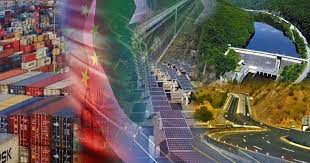10 years of BRI: CPEC agricultural cooperation projects continue to advance

China Economic Net
Beijing: Since the China Pakistan Economic Corridor (CPEC) entered its second stage, China-Pakistan agricultural cooperation has achieved substantial results. According to the research report, “10 Years of Belt and Road Initiative – CPEC”, released by the financial think-tank KASB | KTrade, many advanced Chinese agricultural technologies are promoted in Pakistan, while Chinese and Pakistani universities have also joined forces to develop crop cultivation techniques, China Economic Net (CEN) reported.
Dr Muhammad Ali Raza, a graduate of China’s Sichuan Agricultural University, promoted China’s maize-soybean strip intercropping technology in Pakistan with support from Professor Yang Wenyu. Inter-cropping Technology In 2022, the initiative convinced nearly 200 farmers to adopt this technology. This led to the total demonstrative area of maize-soybean strip intercropping technology to surge over 400 acres, about 2.67 times that of last autumn in Pakistan.
This technology will help Pakistan reduce soybean oil imports, saving valuable foreign reserves. Hybrid Wheat and Rice Chinese hybrid wheat demonstration fields in Pakistan have been maintained at about 3,000-5,000 hectares. About 80% farmers in Pakistan are engaged in wheat production, and the total area of wheat cultivation occupies as much as 40% of the total agricultural land in Pakistan. Hybrid wheat seed yields 40% higher per acre than conventional varieties, which will help Pakistan overcome shortages due to floods and resume wheat exports like in 2011-2013. In addition, the University of Punjab and Wuhan University are collaborating to develop high-yield hybrid rice varieties to boost Pakistan’s rice exports.





